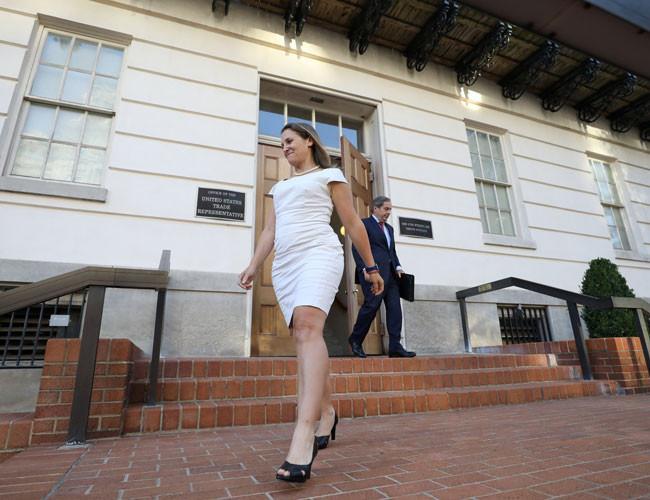
Canada’s top trade negotiator praised Mexico’s trade concessions on autos and labor rights on Aug. 28 as she rejoined NAFTA talks, while U.S. lawmakers warned that a bilateral U.S.-Mexico trade deal would struggle to win approval in Congress.
Automotive executives and other sources also told Reuters on Aug. 28 that the bilateral U.S.-Mexico deal announced on Monday allows President Donald Trump to impose 25 percent tariffs on imports of Mexican-made passenger vehicles and auto parts above certain volumes.
If Trump proceeds with the tariffs now under consideration based on national security concerns, Mexican duty-free exports of cars and sport-utility vehicles to the United States would be capped at 2.4 million vehicles annually. Volumes above that level would be subject to tariffs, auto industry officials and other sources said.
Canadian Foreign Minister Chrystia Freeland said that Mexico’s “difficult” concessions to the United States on Monday would pave the way for productive talks this week as all three countries race toward a Friday deadline for a deal to modernize the 24-year-old North American Free Trade Agreement.
“These concessions are really going to be important for workers in Canada and the United States,” she told reporters after meeting with U.S. Trade Representative Robert Lighthizer.
Freeland, who later met with Mexican officials late on Aug. 28, said she was due to dig into detailed discussions with Lighthizer on Aug. 29.
Canadian Prime Minister Justin Trudeau said on Aug. 28 his position on the supply management system that protects Canada’s dairy farmers has not changed and he will defend it as Canada works to renew the NAFTA trade deal with the United States and Mexico.
He also said good progress had been made on auto terms in the talks between Mexico and the United States, and that Canada looked forward to signing a deal as long as it was good for Canadians.
“My position on defending supply management has not changed,” he told reporters during a visit to the province of Quebec.
Trump warned on Aug. 27 he could proceed with a deal with Mexico alone and levy tariffs on Canada if it does not come on board with the revised trade terms.
After being sidelined from the talks for more than two months, Freeland will be under pressure to accept terms the United States and Mexico worked out on a trade deal announced on Aug. 27.
One of the main sticking points for Canada in the revised deal is the U.S. effort to dump the Chapter 19 dispute resolution mechanism that hinders the United States from pursuing anti-dumping and anti-subsidy cases. Lighthizer said on Monday that Mexico had agreed to eliminate the mechanism.
Other hurdles include intellectual property rights, such as the U.S.-Mexico 10-year data exclusivity for biologic drug makers and extensions of copyright protections to 75 years from 50, all higher thresholds than Canada has previously supported.